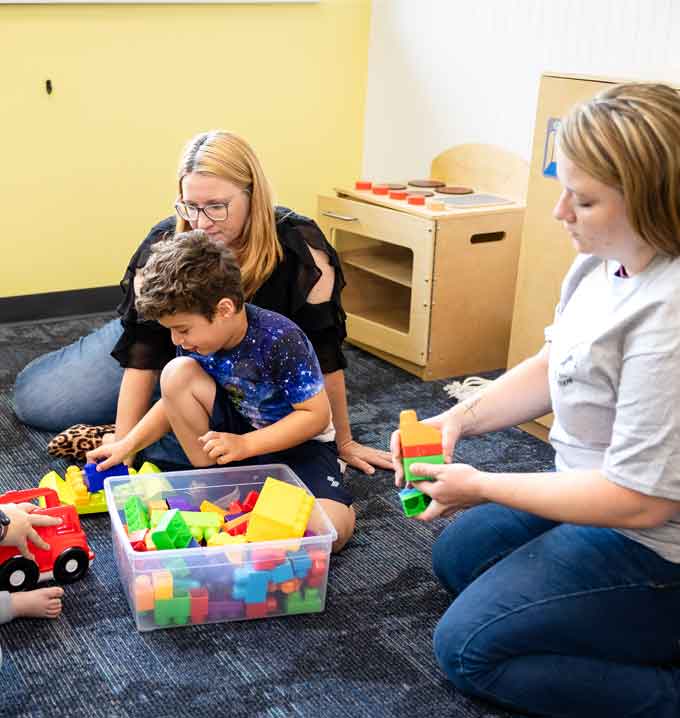Learn About CPI Training
Learn About CPI Training
Parenting an autistic child is a learning experience, for both you and your child, and it comes with moments of uncertainty. We are, after all, only human. It’s only natural that, from time to time, communication falters, emotions escalate, and you’re left wondering how to bring calm back into the moments of chaos. These moments can be heart-wrenching, not just because of the immediate challenges, but because you want your child to feel safe, understood, and supported no matter what. Crisis Prevention Intervention (CPI) was created with this very goal in mind: to empower caregivers with tools to navigate these tough moments with compassion, build trust, and ensure your child’s dignity and emotional well-being remain at the forefront.

What Is Crisis Prevention Intervention for Special Education?
Crisis Prevention Intervention is a training program designed to help educators and caregivers manage challenging behaviors in a safe and respectful manner. In the context of special education, particularly for autistic students, CPI in schools focuses on understanding the triggers of crises, preventing escalation, and responding effectively when challenging situations arise.
At Lighthouse Autism Center, safety is our priority, and we take great pride in the safety precautions implemented at our centers to ensure a nurturing, secure environment where every child can learn, grow, and thrive. Crisis Prevention Intervention (CPI) training is one of many safety precautions we use at all our centers. Every employee receives weeks of training and is certified in first aid, CPR, and CPI before beginning therapy with a child.
What Is CPI Training?
When we refer to CPI, we are also referring to an organization, the Crisis Prevention Institution. CPI teaches a strategy called Non-Violent Crisis Intervention. This strategy is used for crisis prevention for a wide variety of people, including those with autism spectrum disorders. Non-violent crisis intervention training is designed to teach best practices for managing difficult situations and disruptive behaviors. Behavior technicians or Registered Behavior Technicians (RBTs) learn how to identify at-risk individuals and use nonverbal and verbal techniques to defuse unsafe behavior. This type of training not only ensures the utmost safety of the children at our centers but also the safety of our staff.
The Crisis Prevention Institute (CPI) is an international training organization that specializes in the safe management of disruptive and assaultive behavior. Since 1980, more than six million professionals have participated in CPI’s training, and thousands of organizations worldwide have successfully implemented CPI’s safe, non-harmful techniques and developed comprehensive crisis prevention and intervention plans. Only highly trained and certified CPI instructors are equipped to teach others CPI methods.
What Is a CPI Instructor?
A CPI instructor is someone who has gone through rigorous training through the CPI training organization and has been certified as an instructor. They are taught the tools and techniques to instruct and teach others to implement CPI strategies where needed. This certification requires regular re-training and active participation in training annually.
The Benefits of CPI at the Lighthouse Autism Center
Crisis prevention training and ABA Therapy (Applied Behavior Analysis) go hand-in-hand when it comes to supporting autistic individuals, with these strategies complement each other in addressing behavioral challenges. For example, if an autistic child exhibits aggressive behavior, CPI techniques can help manage the situation safely, while ABA principles guide the long-term approach to addressing the behavior. There are a huge number of benefits when it comes to using CPI strategies. These are the most notable.
- Teaches staff to recognize and respond to a crisis appropriately: CPI teaches our staff imperative decision-making skills to effectively match their response to the level of risk in the crisis. They learn to focus on the least restrictive response to ensure crises are de-escalated with as little fuss as possible. They are taught how to recognize the different stages of an escalating crisis and how to use evidence-based techniques to de-escalate.
- Safe physical intervention as a last resort: Staff are trained to respond appropriately to the level of risk. Sometimes de-escalation strategies don’t work, and the risk requires physical intervention. CPI teaches staff the best physical intervention strategies to ensure as little trauma as possible and to be able to immediately begin pairing again with their learner.
- It’s fully accredited: CPI is an evidence-based training program that is also fully accredited. The training is reviewed bi-annually to ensure all interventions are up to international standards.
Why We Use CPI at Lighthouse Autism Center
CPI is an excellent non-violent crisis intervention strategy for a wide range of people. We find it aligns well with our practices for our learners mostly because it is so proactive and focuses on de-escalation strategies. Autistic people have unique personalities and behavioral characteristics, and the nature of autism means that there are some special circumstances to consider when employing CPI techniques with them.
How CPI Is Implemented at the Lighthouse Autism Centers
Addressing behavior changes in autistic children proactively can help reduce the likelihood of crises. Here are just a few of the CPI strategies we use for autistic children:
Understanding How Autism Shows Up in Individual Children
Autism shows up in every person differently, and there is no such thing as one size fits all. Our staff works closely with a child’s parents, teachers, and other adults in their lives to learn about their specific anxiety signs and triggers. For example, some autistic children can clench their fists when they are happy or excited. Others do this when they are starting to feel anxious or frustrated.
It’s important to understand what triggers every child has. Do they like to be touched? Or should touching be avoided? Do they like schedules, and if so, what kind of schedules? What are their very favorite things? What has helped calm this child down in the past? You can see the other important questions that are asked in our Tips for Parents blog post. These types of questions allow our staff to intervene using the right type of support to avoid escalation.
Teaching Communication Skills
Autistic children struggle to verbalize their needs and wants, which often leads to frustration. Our staff finds out how the child tends to communicate when they ask for things. They will also teach the child how to ask for specific things that might not be tangible.
We will figure out the best system for the child, whether that’s verbal, sign language, or something in between. Teaching autistic children these skills is an excellent way to avoid crises and escalating frustration.
Safely Using Holds as a Last Resort
CPI strategies only use physical interventions as the very last resort and only when the child’s behavior is posing more risk to their own safety than any physical hold does. While none of us ever want to have to physically intervene, we are taught to safely and effectively use physical interventions with children in a way that reduces harm. Following any crisis, we also focus on repairing the relationship with our learners as soon as possible, going back to the fun and proactive interventions.
The Best Autism Treatment With Lighthouse Autism Center
At Lighthouse Autism Center, we believe that we can help every child reach their true potential with our innovative treatment approach to autism. CPI strategies are just one small facet of the incredible work that our staff do throughout our centers.
Don’t hesitate to contact us if you’d like to talk to someone about our treatments and how we can help your child.
Together, we can unlock your child’s potential
Related News

06/11/2025
Overcoming Stereotypes
Autism stereotypes are common and can have significant social consequences for autistic children. Misconceptions hinder the acceptance and inclusion of autistic children. Challenging these stereotypes is vital for creating a more understanding and supportive society. Challenging Common Autism Stereotypes When people hear the word “autism,” they often imagine a narrow set of images, like the […]

06/11/2025
What’s Next After ABA Therapy?
There are a number of reasons why an autistic child might stop ABA therapy, and one is that they have reached their goals. In this article, we take a look at what parents can expect going forward. What Are the Next Steps After ABA Therapy? As a parent, you only want what’s best for your […]

06/11/2025
Do Babies with Autism Smile?
We take a look at the importance of early intervention, some of the milestones for parents to look out for, and the more common signs of autism in babies. Do Babies with Autism Smile? Watching your baby grow is an exciting time, certainly one of life’s quiet wonders. From those first sleepy stretches to the […]


